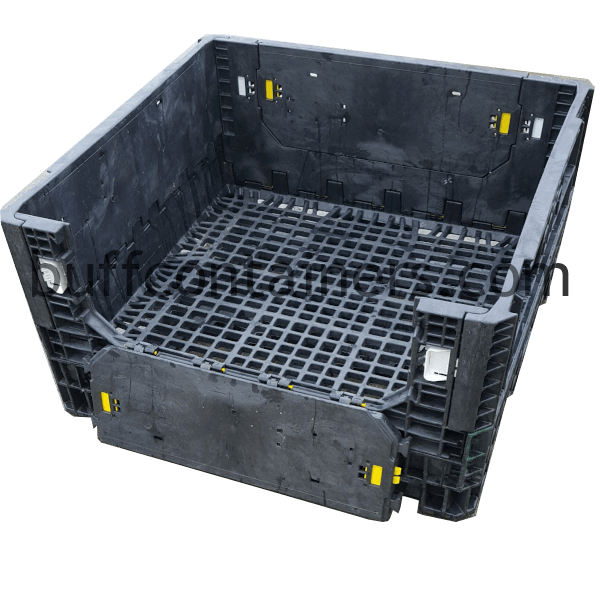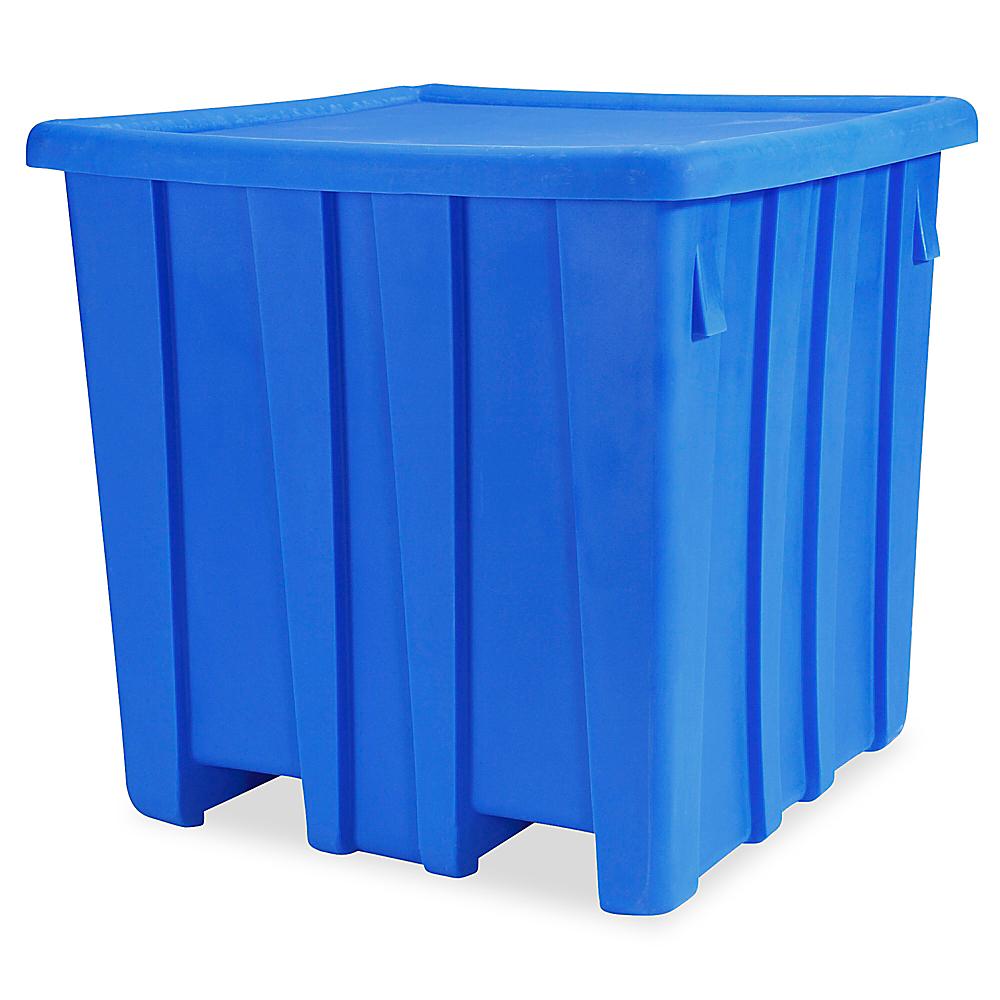Learn why Bulk Plastic Containers are ideal for modern warehousing needs
The Function of Mass Plastic Containers in Effective Recycling Practices and Sustainability
Mass plastic containers are indispensable to modern reusing efforts. Their design improves the effectiveness of material collection and transport, adding to sustainability goals. These containers not only enhance area yet also assist in keeping track of contamination levels. Nevertheless, their implementation is not without obstacles. Recognizing the full extent of their impact exposes an intricate connection between logistics and ecological obligation that calls for more exploration.
Understanding Bulk Plastic Containers
Mass plastic containers work as a crucial part in different industries, assisting in the storage space and transportation of items. These containers are commonly made from robust products such as high-density polyethylene (HDPE) or polypropylene, which supply toughness and resistance to environmental factors. Their layout typically includes attributes like stackability and modularity, enabling efficient use space throughout both storage and transportation.
Industries such as agriculture, food handling, and manufacturing frequently use mass plastic containers as a result of their light-weight nature and simplicity of handling. The containers can be found in different dimensions and setups, accommodating the certain requirements of different items. Their convenience prolongs past simple performance; they can also be personalized with lids, handles, and identifying options to boost functionality - plastic bulk containers. Therefore, bulk plastic containers play an important duty in maximizing logistics and supply chain procedures across several fields, thus contributing to general effectiveness and cost-effectiveness
Advantages of Using Bulk Plastic Containers in Recycling
The usage of bulk plastic containers considerably improves the effectiveness of the procedure when companies prioritize reusing initiatives. These containers are designed to enhance area, permitting the storage space and transportation of bigger amounts of recyclable products. This results in fewer journeys to recycling facilities, consequently lowering fuel usage and connected emissions.
In addition, bulk plastic containers are resilient and resistant to various environmental factors, making certain that materials continue to be safeguarded during handling and transportation. Their lightweight design better adds to reduce transportation expenses.
The uniformity of these containers helps with better sorting and handling of recyclable products, which can improve total recycling rates. Organizations that embrace bulk plastic containers also demonstrate a commitment to sustainability, positively influencing their brand name image. Eventually, these advantages not only streamline recycling practices however also add to wider ecological objectives
Exactly How Bulk Plastic Containers Facilitate Product Collection
Reliable material collection is considerably improved by the use bulk plastic containers, as they supply a structured and effective remedy for gathering recyclable things. These containers are developed to suit big volumes of products, which simplifies the sorting and storage space process. Their stackable style makes best use of area application, making it simpler for centers to arrange recyclables without clutter.
On top of that, mass plastic containers are resilient and weather-resistant, permitting exterior positioning without deterioration. This durability assures that products remain protected up until they are accumulated for handling.

The uniformity in shapes and size of these containers helps with standardization across collection factors, making it possible for better monitoring of recyclable quantities. Their clear nature permits for very easy presence of contents, aiding in the surveillance of contamination levels and ensuring that only appropriate products are collected. On the whole, mass plastic containers play a critical role in improving the product collection process, thereby promoting effective reusing methods.
Transport Performance and Environmental Impact
Transportation effectiveness plays an essential duty in the reusing procedure, especially through the optimization of lots capacity wholesale plastic containers. By optimizing the quantity of product delivered, business can considerably decrease the variety of trips needed, thus decreasing their carbon impact. This method not only boosts operational performance yet likewise adds to a lot more sustainable ecological practices.

Optimizing Tons Capacity
Although optimizing tons capability is frequently ignored, it plays a crucial duty in boosting transport efficiency and minimizing environmental effect in reusing practices. By optimizing the quantity that bulk plastic containers can hold, reusing operations can lower the number of trips needed for transportation. This not only lowers gas intake however also reduces the damage on vehicles. Efficient lots monitoring allows centers to make use of area properly, ensuring that each transportation cycle is as effective as feasible. Additionally, well-optimized tons can result in much better settlements with logistics carriers, potentially reducing general expenses. Ultimately, boosting lots ability adds to a more lasting recycling system by promoting reliable resource usage and decreasing waste created throughout transport.
Lowering Carbon Impact
As reusing procedures This Site endeavor to minimize their ecological effect, reducing the carbon footprint connected with transportation becomes a critical objective. Mass plastic containers play a critical role in achieving this goal by boosting lots performance and optimizing logistics. Their light-weight yet resilient layout permits maximum cargo room application, lowering the variety of trips needed to transfer products. By consolidating deliveries, reusing facilities can lower gas consumption and greenhouse gas discharges. Additionally, purposefully finding recycling facilities decreases transport distances, in addition lowering carbon outcomes. Employing fuel-efficient vehicles and alternative power sources improves overall sustainability. By integrating these practices, the reusing industry can appreciably diminish its carbon impact, contributing to a more lasting future.
Challenges in making use of Mass Plastic Containers

Contamination Issues
Contamination issues represent a considerable difficulty in the efficient usage of bulk plastic containers within recycling techniques. These containers frequently gather deposits from previous components, leading to mixed materials that can impede the recycling process. Pollutants such as food waste, chemicals, or non-recyclable products can endanger the honesty of the entire batch, leading to enhanced disposal prices and lowered reusing prices. In addition, improper cleaning or sorting can worsen these issues, making it tough for recycling centers to process products effectively. The presence of pollutants not only impacts the top quality of recycled items but additionally undermines the general sustainability initiatives targeted at reducing plastic waste. Dealing with these contamination obstacles is important for boosting the efficacy of bulk plastic container recycling.
Recycling Framework Limitations
Ineffectiveness in reusing see this page framework poses considerable challenges for the effective management of mass plastic containers. Lots of recycling centers lack the capacity to process big quantities of these containers effectively, resulting in enhanced prices and delays. Poor arranging technologies frequently lead to contamination, as mass containers might be blended with other products, complicating the recycling procedure. Limited transportation choices additionally prevent the movement of bulk plastic containers to ideal reusing facilities, causing enhanced landfill waste. Additionally, a lack of standardized procedures for bulk container reusing develops complication among customers and organizations, even more complicating initiatives to promote sustainability. Addressing these framework limitations is important to enhance recycling techniques and take full advantage of the capacity of mass plastic containers in a round economic situation.
Ideal Practices for Executing Bulk Plastic Containers
When companies consider applying bulk plastic containers in their reusing practices, they need to prioritize a strategic method that improves performance and lowers contamination dangers. First, choosing the ideal container size and type is vital to accommodate the volume of products being refined. Organizations ought to likewise establish clear labeling and signs to direct users on appropriate disposal techniques, minimizing complication and mistakes. Normal training sessions for personnel can even more enhance these techniques, ensuring everyone understands their roles in keeping recycling honesty.
Additionally, companies must carry out a routine upkeep schedule to check and clean containers, stopping the buildup of pollutants. Partnering with regional recycling facilities can additionally simplify the collection process, ensuring that materials are effectively processed. Ultimately, companies should monitor and review their recycling metrics, utilizing this information to refine methods gradually and promote constant improvement in their sustainability efforts.
The Future of Mass Plastic Containers in Sustainable Practices
As companies significantly focus on sustainability, the duty of bulk plastic containers in recycling practices is established to evolve considerably. Technologies in materials scientific research are causing the advancement of recyclable and biodegradable choices, boosting the ecological benefits of mass plastic containers. On top of that, the implementation of closed-loop systems will certainly enable less complicated collection and repurposing of these containers, decreasing waste and source usage.
Technical developments, such as smart monitoring systems, will allow companies to check the lifecycle of mass containers, enhancing efficiency in recycling procedures. As customer demand for lasting practices expands, businesses will likely take on mass plastic containers designed for reuse and long-lasting worth. Moreover, cooperation in between federal governments and industries will cultivate the facility of standardized reusing methods, ensuring that mass containers are effectively integrated right into wider sustainability efforts. Generally, the future of mass plastic containers appears encouraging, with considerable potential for contributing to a circular economy.
Frequently Asked Questions
How Are Mass Plastic Containers Made and What Products Are Utilized?
Mass plastic containers are generally made from high-density polyethylene (HDPE) or polypropylene (PP) These products are refined through shot molding or blow molding methods, causing sturdy, lightweight containers appropriate for numerous storage space and transportation needs.
Can Bulk Plastic Containers Be Recycled Several Times Prior To Recycling?
Yes, bulk plastic containers can be recycled several times prior to recycling. Their toughness and layout enable duplicated use in different applications, promoting sustainability and resource efficiency while lowering the need for brand-new containers.

What Accreditations Exist for Bulk Plastic Containers in Recycling?
Numerous accreditations for bulk plastic containers include the Recycling Partnership's certification, the Cradle to Cradle Certified ™ requirement, and the Lasting Packaging Union's standards, guaranteeing containers meet particular environmental and recyclability requirements for efficient recycling.
Exactly How Do Mass Plastic Containers Compare to Various Other Recycling Storage Options?
Bulk plastic containers offer higher toughness and capacity compared to various other recycling storage options, see this site decreasing the risk of contamination and facilitating efficient transportation. Their style sustains better organization, boosting overall efficiency in reusing operations.
What Is the Life expectancy of a Mass Plastic Container in Recycling Processes?
The lifespan of a bulk plastic container in reusing procedures typically ranges from 5 to ten years, depending on use, worldly top quality, and environmental problems, permitting numerous cycles of use before ultimate disposal or recycling.
When companies focus on recycling efforts, the application of mass plastic containers considerably enhances the efficiency of the process. Transport efficiency plays a vital function in the recycling procedure, specifically via the optimization of load ability in bulk plastic containers. The usage of bulk plastic containers in recycling practices encounters substantial difficulties, especially worrying contamination issues and constraints within reusing infrastructure. Contamination concerns represent a considerable obstacle in the efficient use of mass plastic containers within recycling techniques. When companies take into consideration carrying out bulk plastic containers in their recycling practices, they ought to focus on a strategic strategy that enhances efficiency and decreases contamination risks.